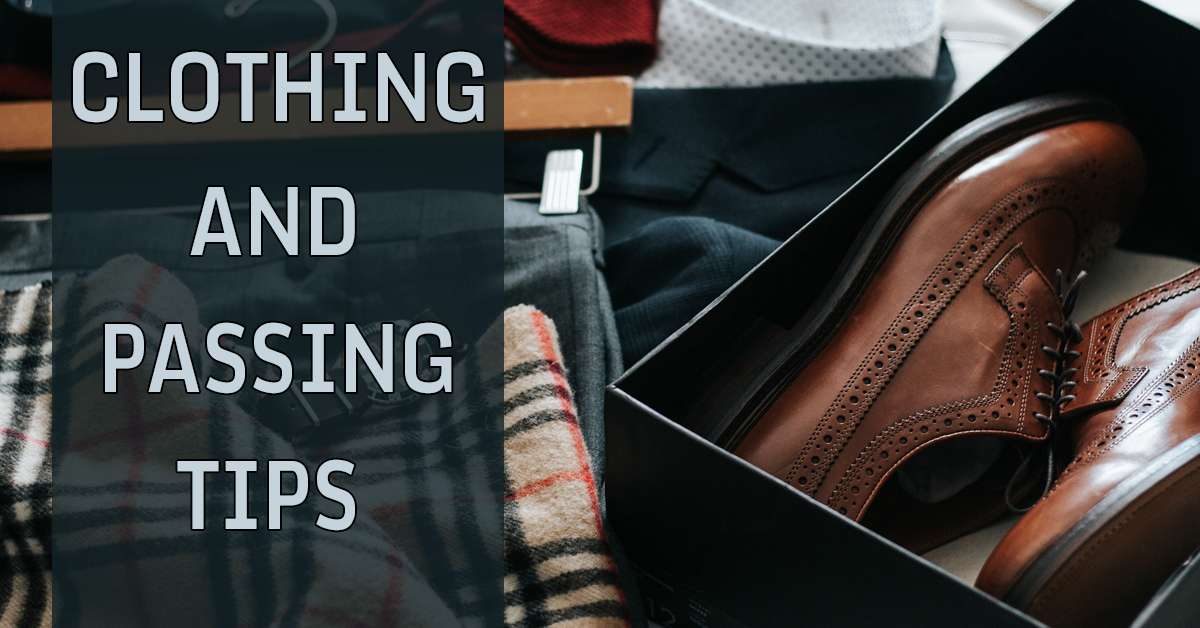
Clothing and Passing Tips
Clothing and passing tips to help you. When it comes to finding clothes while transitioning it should be down to personal preference. You should wear whatever you feel comfortable in. What some sites suggest may not work for everyone. I myself didn’t change anything about what I wore as I have always worn men’s clothing as I always felt more comfortable and at ease.
If you don’t already wear men’s clothes then try it out, find what you feel comfortable in. Some people have a different or alternative style, some like jeans and T-shirts others like to dress more formally. Some men like to accessorise, some don’t. There is no set way to dress as everyone’s taste is different.
Here are some clothing and passing tips that may help
Tip 1 – Clothing

A, Jeans – When it comes to finding jeans pre-T can be quite frustrating at times. More so for those of us that are a little curvy around the hips and struggle to find anything to detract away from that area.
Some suggest buying jeans a size bigger others say to alter how you stand and walk, males tend to stand with their feet further apart and it’s the same for walking, image your walking on two lines instead of one, practice makes perfect.
B, Shirts – Wear shirts that fit, but try and avoid patterns unless you are already fairly flat chested. Try and avoid shirts with horizontal strips as this makes your chest look bigger. Layers can also help when passing, this is done by using vests and t-shirts with your binder.
Even though it will be tempting to go out and buy new clothes, just be wary that when you start taking hormones your body shape will start to change as your body fat redistributes to other areas. If you want to change your clothing style have a look in some thrift stores for ideas.
Above all else wear what ever you want, and not what others say you have to wear ‘to pass as male’.
Tip 2 – Hair Styles
If you feel comfortable in staying with your own hairdresser then stay there. A lot of people do recommend that you have your hair cut at a barber as they are used to doing a variety of men’s hair styles.
I have used different hairdressers during my transition but for the last couple of years I have been using the same one. I have never been to a barbers and probably never will, its not that I don’t want too it’s more due to the fact that I have a hairdresser that knows how to cut my hair.
Tip 3 – Posture and body hair
My best suggestion on this is to watch men while you are out. Observe how they sit, how they carry themselves and how they walk. What’s even better is if you have brothers or male friends they can guide you on what you can do to help you pass and let you know if you are doing more than you should (or not enough).
As for body hair its time to let it grow! I found it very strange in the beginning considering I had spent the best part of 20 years shaving it all off and it did take some getting used too. Being pre-T my leg hair doesn’t even reach my knees so I tend to stick to wearing jeans or joggers till my leg hair starts to grow.
Tip 4 – Shaving
Pre-hormone shaving
If you want to start shaving you can if you wish its entirely up to you. I found it made me feel a lot more masculine. So every few days I get rid of the peach fuzz. Being clean shaven can also help with passing.
Shaving when on hormones
When your facial hair starts to come through I know some of you will want to leave it but eventually you will want to shave. You can either wet shave, which gives you a closer shave, or for quickness using an electric shaver is ideal.
Some of the products you can use are:
- Shaving cream or gel
- Face scrub, which softens the facial hair before shaving
- Post shave balm, which reduces irritation from shaving and soothes the skin.
Tip 5 – Voice
I know some people struggle when it comes to speaking as we feel it can let us down when we try to pass as male. Below are a few tips that you can try that may help, while you are waiting to take hormones or even if you are going down the road of natural transition.
Try and talk quieter and slower. If you get excited and start talking loudly, your voice might start getting higher. Also think before you speak. Make your voice a little scratchy to block out the highness. You can also try talking in a deeper tone. The only problem with that is the moment you stop thinking about it your voice will go back to normal pitch.
There may also be voice coaches available to help.
- FTM Voice Training
- Voice masculinization on Youtube
